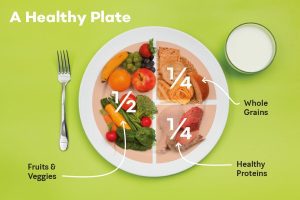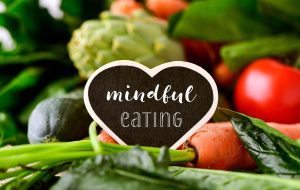Understanding Balanced Nutrition
Nutrition plays a crucial role in our overall health and well-being. It’s not just about what we eat, but how we structure our meals to ensure we’re providing our bodies with the essential nutrients they need to function optimally. Building a healthy plate is like constructing a masterpiece – it requires the right ingredients in the right proportions. Explore More About Health Issues and Their Solutions (How To Improve You Health in 30 Days)

The Importance of Building a Healthy Plate
A balanced plate ensures that we consume a variety of nutrients, including carbohydrates, proteins, fats, vitamins, and minerals, in appropriate amounts. This helps support various bodily functions, such as metabolism, immunity, and overall vitality.
Key Components of a Healthy Plate
- Vegetables: Fill half your plate with colorful vegetables such as leafy greens 🥬, bell peppers 🫑, carrots 🥕, and broccoli 🥦. These are rich in vitamins, minerals, and antioxidants essential for good health.
- Proteins: Incorporate lean proteins like chicken 🍗, fish 🐟, tofu 🥢, or legumes into your meals. Protein is vital for muscle repair and growth, as well as satiety, helping you feel full and satisfied after eating.
- Whole Grains: Opt for whole grains like brown rice 🍚, quinoa 🍲, or whole wheat bread 🍞 over refined grains. They provide fiber, which aids in digestion and helps regulate blood sugar levels.
- Healthy Fats: Include sources of healthy fats such as avocados 🥑, nuts 🌰, seeds 🌻, and olive oil 🫒 in moderation. These fats are important for brain function, hormone production, and nutrient absorption.

Tips for Building a Healthy Plate
Eat Fruit 🍎
Incorporate a variety of fruits into your diet to add natural sweetness and a dose of vitamins and minerals. Enjoy fresh fruits as snacks, add them to smoothies, or include them in salads for a refreshing burst of flavor.
Drink Water 💧
Staying hydrated is crucial for overall health and well-being. Aim to drink plenty of water throughout the day, and hydrate with herbal teas or infused water for added flavor and hydration benefits.
Eat Adequate Protein 🍗
Protein is essential for muscle repair, growth, and overall health. Ensure you’re consuming an adequate amount of protein with each meal to support your body’s needs and promote satiety.
Avoid Sugary Drinks 🚫🥤
Limit your intake of sugary drinks like soda, fruit juices, and sweetened beverages. These drinks are often high in calories and provide little to no nutritional value, contributing to weight gain and increased risk of chronic diseases.
Food
Choose whole, unprocessed foods whenever possible, as they’re packed with nutrients and free from added sugars, unhealthy fats, and artificial ingredients. Focus on incorporating a variety of foods into your diet to ensure you’re getting a wide range of nutrients.

Building Healthy Habits
Meal Planning 📋
Plan your meals ahead of time to ensure they’re balanced and nutritious. This can help you make healthier choices and avoid last-minute decisions that may not align with your goals. Get creative with meal prep and try new recipes to keep things exciting.
Cooking at Home 🍳
Cooking at home allows you to have more control over the ingredients you use and how your meals are prepared. Experiment with different cooking methods and flavors to create delicious and nutritious meals that you’ll look forward to eating.
Reading Labels 🏷️
When grocery shopping, take the time to read nutrition labels and ingredient lists. Look for products with minimal added sugars, sodium, and unhealthy fats, and choose whole, unprocessed foods whenever possible. Pay attention to serving sizes and be mindful of portion control.
Mindful Eating Habits 🧘♂️ to Building a Healthy Plate
Mindful eating is about being present and attentive while eating, allowing you to truly savor and enjoy your food. By practicing mindful eating habits, you can develop a healthier relationship with food and better manage your eating habits.
Slow Down ⏳
Take your time to eat your meals, chewing each bite thoroughly and savoring the flavors and textures. Eating slowly allows your body to properly digest food and gives your brain time to register feelings of fullness, reducing the likelihood of overeating. This mindful eating habit encourages you to be more in tune with your body’s signals and enjoy the experience of eating.
Pay Attention to Hunger and Fullness Cues 🍽️
Listen to your body’s hunger and fullness signals, eating when you’re hungry and stopping when you’re satisfied. Avoid eating out of boredom, stress, or other emotional triggers, and learn to distinguish between physical hunger and other cravings. Practicing this mindful eating habit helps you become more attuned to your body’s needs and promotes a healthier relationship with food.
Engage Your Senses 🌟
Engage all your senses while eating, appreciating the colors, smells, tastes, and textures of your food. Notice the sensations of hunger and satisfaction, as well as any emotional responses that may arise during the eating experience. This mindful eating habit encourages you to fully immerse yourself in the present moment and enjoy the sensory pleasures of eating.
Remove Distractions 📵
Minimize distractions while eating, such as watching TV, scrolling through your phone, or working at your computer. Instead, focus solely on the act of eating, allowing yourself to fully enjoy the experience and tune into your body’s cues. By practicing this mindful eating habit, you can cultivate a deeper connection with your food and enhance your overall dining experience.
Practice Gratitude 🙏
Take a moment before each meal to express gratitude for the food on your plate and the nourishment it provides. Cultivating a sense of gratitude can help foster a positive relationship with food and encourage mindful eating habits. By appreciating the abundance of nourishing foods available to you, you can approach meals with a sense of joy and appreciation.
By incorporating these mindful eating habits into your daily routine, you can develop a greater awareness of your eating patterns and make more conscious choices that support your overall health and well-being. Mindful eating is not about following strict rules or restrictions but rather about tuning into your body’s needs and nourishing it with love and intention.

| Nutrient | Vegetables | Fruits | Proteins | Whole Grains | Healthy Fats |
|---|---|---|---|---|---|
| Vitamins | A, C, K | C, A, K | B, D | B, E | E, K |
| Minerals | Potassium, Iron | Potassium | Iron, Zinc | Magnesium, Zinc | Magnesium, Zinc |
| Fiber | High | Moderate | Low | High | Low |
| Protein | Low | Low | High | Moderate | Low |
| Healthy Fats | Low | Low | Low | Low | High |
Final thoughts (Building a Healthy Plate)
Building a healthy plate is essential for promoting overall health and well-being. By following these essential nutrition tips and incorporating them into your daily routine, you can ensure that every meal you eat provides the nourishment your body needs to thrive. Remember, it’s not about deprivation or strict rules but rather about making informed choices that support a balanced and fulfilling lifestyle.
FAQS (Building a Healthy Plate)
- Why is it important to build a healthy plate?
- Building a healthy plate ensures that we consume a variety of nutrients necessary for optimal health and well-being.
- What should I fill half of my plate with?
- Half of your plate should be filled with colorful vegetables like leafy greens, bell peppers, carrots, and broccoli, rich in essential vitamins and minerals.
- Why is protein important in a balanced diet?
- Protein is crucial for muscle repair, growth, and satiety, helping you feel full and satisfied after meals while supporting overall health.
- How can I incorporate fruits into my diet?
- You can enjoy fruits as snacks, add them to smoothies, or include them in salads for a refreshing burst of flavor and a dose of vitamins and minerals.
- What are some healthy fat sources I can include in my diet?
- Healthy fats like avocados, nuts, seeds, and olive oil are important for brain function, hormone production, and nutrient absorption.
- Why should I avoid sugary drinks?
- Sugary drinks provide little to no nutritional value and can contribute to weight gain and increased risk of chronic diseases like diabetes and heart disease.
- How can I ensure I’m drinking enough water?
- Aim to drink plenty of water throughout the day and hydrate with herbal teas or infused water for added flavor and hydration benefits.
- What are some tips for portion control?
- Use visual cues like the palm of your hand or a deck of cards to gauge appropriate serving sizes for proteins and grains.
- Why is cooking at home beneficial for my health?
- Cooking at home allows you to have more control over the ingredients you use and how your meals are prepared, promoting healthier eating habits.
- How can meal planning help me maintain a balanced diet?
- Planning your meals ahead of time can help you make healthier choices and avoid last-minute decisions that may not align with your nutrition goals, leading to a more balanced and nutritious diet.












